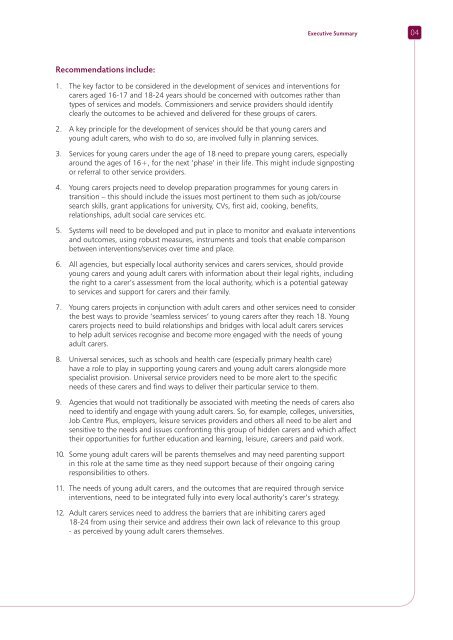Young Adult Carers in the UK - The Princess Royal Trust for Carers
Young Adult Carers in the UK - The Princess Royal Trust for Carers
Young Adult Carers in the UK - The Princess Royal Trust for Carers
You also want an ePaper? Increase the reach of your titles
YUMPU automatically turns print PDFs into web optimized ePapers that Google loves.
Recommendations <strong>in</strong>clude:<br />
1. <strong>The</strong> key factor to be considered <strong>in</strong> <strong>the</strong> development of services and <strong>in</strong>terventions <strong>for</strong><br />
carers aged 16-17 and 18-24 years should be concerned with outcomes ra<strong>the</strong>r than<br />
types of services and models. Commissioners and service providers should identify<br />
clearly <strong>the</strong> outcomes to be achieved and delivered <strong>for</strong> <strong>the</strong>se groups of carers.<br />
2. A key pr<strong>in</strong>ciple <strong>for</strong> <strong>the</strong> development of services should be that young carers and<br />
young adult carers, who wish to do so, are <strong>in</strong>volved fully <strong>in</strong> plann<strong>in</strong>g services.<br />
Executive Summary<br />
3. Services <strong>for</strong> young carers under <strong>the</strong> age of 18 need to prepare young carers, especially<br />
around <strong>the</strong> ages of 16+, <strong>for</strong> <strong>the</strong> next ‘phase’ <strong>in</strong> <strong>the</strong>ir life. This might <strong>in</strong>clude signpost<strong>in</strong>g<br />
or referral to o<strong>the</strong>r service providers.<br />
4. <strong>Young</strong> carers projects need to develop preparation programmes <strong>for</strong> young carers <strong>in</strong><br />
transition – this should <strong>in</strong>clude <strong>the</strong> issues most pert<strong>in</strong>ent to <strong>the</strong>m such as job/course<br />
search skills, grant applications <strong>for</strong> university, CVs, first aid, cook<strong>in</strong>g, benefits,<br />
relationships, adult social care services etc.<br />
5. Systems will need to be developed and put <strong>in</strong> place to monitor and evaluate <strong>in</strong>terventions<br />
and outcomes, us<strong>in</strong>g robust measures, <strong>in</strong>struments and tools that enable comparison<br />
between <strong>in</strong>terventions/services over time and place.<br />
6. All agencies, but especially local authority services and carers services, should provide<br />
young carers and young adult carers with <strong>in</strong><strong>for</strong>mation about <strong>the</strong>ir legal rights, <strong>in</strong>clud<strong>in</strong>g<br />
<strong>the</strong> right to a carer’s assessment from <strong>the</strong> local authority, which is a potential gateway<br />
to services and support <strong>for</strong> carers and <strong>the</strong>ir family.<br />
7. <strong>Young</strong> carers projects <strong>in</strong> conjunction with adult carers and o<strong>the</strong>r services need to consider<br />
<strong>the</strong> best ways to provide ‘seamless services’ to young carers after <strong>the</strong>y reach 18. <strong>Young</strong><br />
carers projects need to build relationships and bridges with local adult carers services<br />
to help adult services recognise and become more engaged with <strong>the</strong> needs of young<br />
adult carers.<br />
8. Universal services, such as schools and health care (especially primary health care)<br />
have a role to play <strong>in</strong> support<strong>in</strong>g young carers and young adult carers alongside more<br />
specialist provision. Universal service providers need to be more alert to <strong>the</strong> specific<br />
needs of <strong>the</strong>se carers and f<strong>in</strong>d ways to deliver <strong>the</strong>ir particular service to <strong>the</strong>m.<br />
9. Agencies that would not traditionally be associated with meet<strong>in</strong>g <strong>the</strong> needs of carers also<br />
need to identify and engage with young adult carers. So, <strong>for</strong> example, colleges, universities,<br />
Job Centre Plus, employers, leisure services providers and o<strong>the</strong>rs all need to be alert and<br />
sensitive to <strong>the</strong> needs and issues confront<strong>in</strong>g this group of hidden carers and which affect<br />
<strong>the</strong>ir opportunities <strong>for</strong> fur<strong>the</strong>r education and learn<strong>in</strong>g, leisure, careers and paid work.<br />
10. Some young adult carers will be parents <strong>the</strong>mselves and may need parent<strong>in</strong>g support<br />
<strong>in</strong> this role at <strong>the</strong> same time as <strong>the</strong>y need support because of <strong>the</strong>ir ongo<strong>in</strong>g car<strong>in</strong>g<br />
responsibilities to o<strong>the</strong>rs.<br />
11. <strong>The</strong> needs of young adult carers, and <strong>the</strong> outcomes that are required through service<br />
<strong>in</strong>terventions, need to be <strong>in</strong>tegrated fully <strong>in</strong>to every local authority’s carer’s strategy.<br />
12. <strong>Adult</strong> carers services need to address <strong>the</strong> barriers that are <strong>in</strong>hibit<strong>in</strong>g carers aged<br />
18-24 from us<strong>in</strong>g <strong>the</strong>ir service and address <strong>the</strong>ir own lack of relevance to this group<br />
- as perceived by young adult carers <strong>the</strong>mselves.<br />
04


